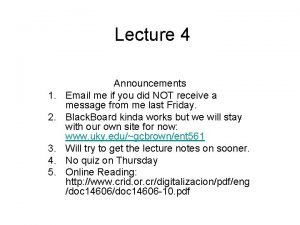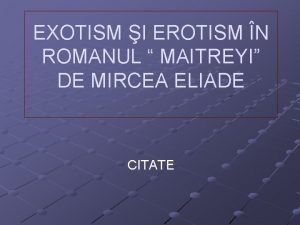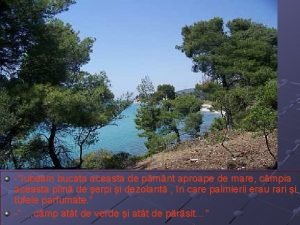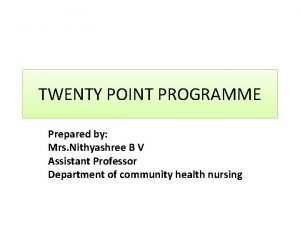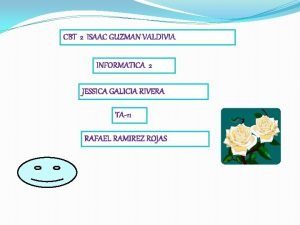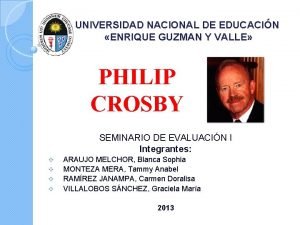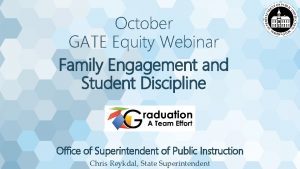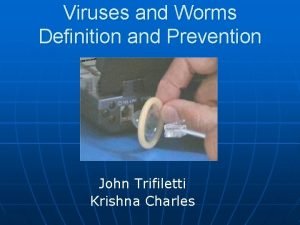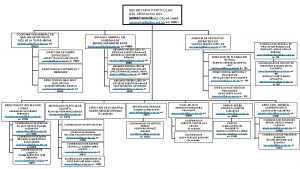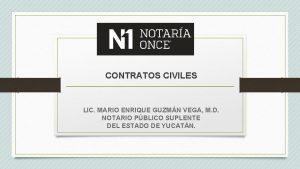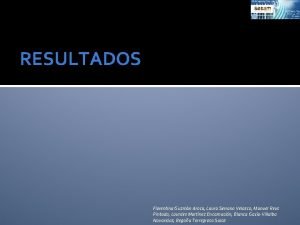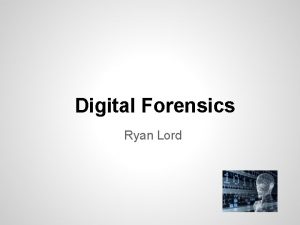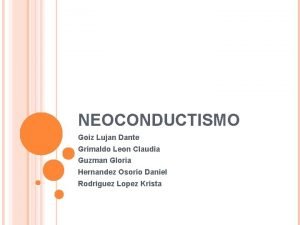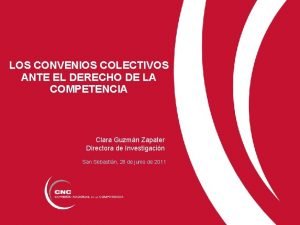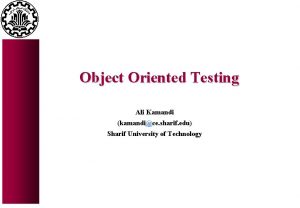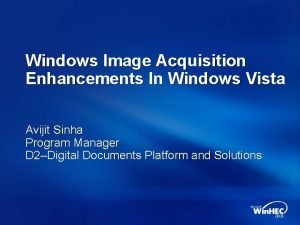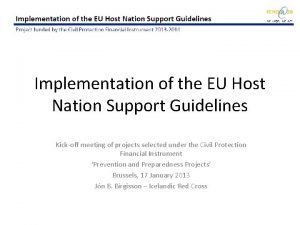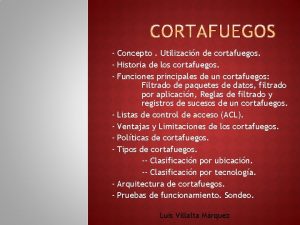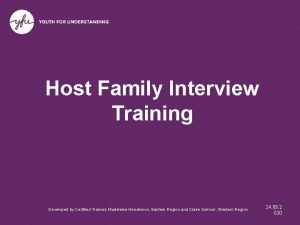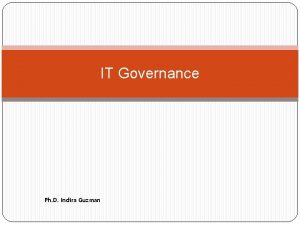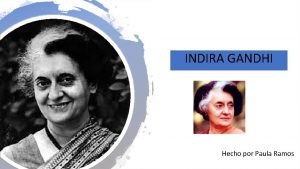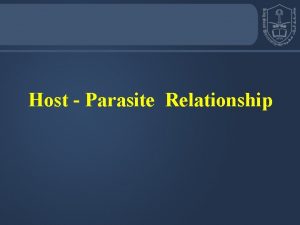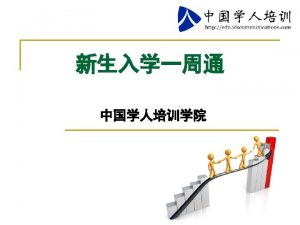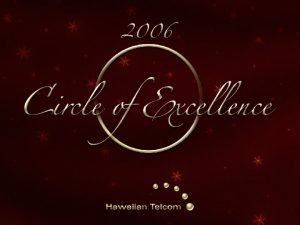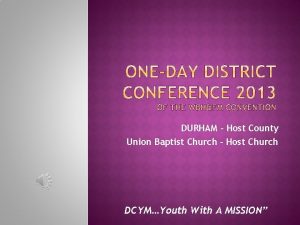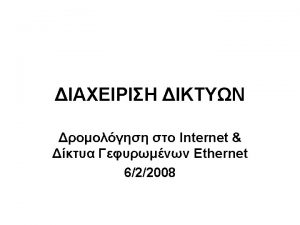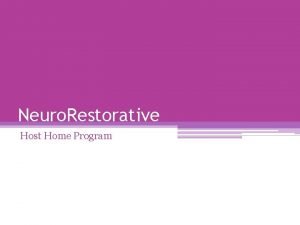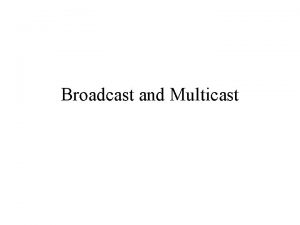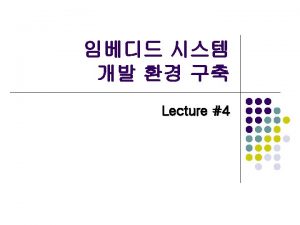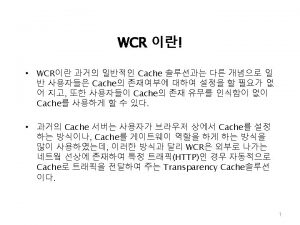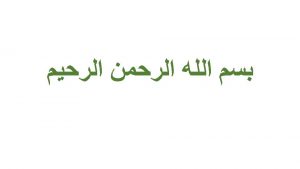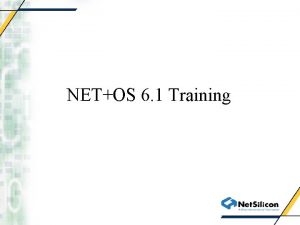Host Dr Indira Guzman Indira Guzmantrident edu Presenter





























- Slides: 29

Host: Dr. Indira Guzman - Indira. Guzman@trident. edu Presenter: Dr. Kenneth Cromer – Kenneth. Cromer@trident. edu

• Welcome to Literature Review Strategies for Doctoral Research! • There will be time for questions and answers at the end of the webinar – please submit them via the Questions box on your Control Panel, or email them to daniel. sloan@trident. edu • Attendees will receive a link to this webinar and a copy of the slidedeck later this week.

Host Dr. Indira Guzman Doctoral Studies Director, Glenn R. Jones College of Business Expertise Management Information Systems, E-Learning, IT Occupational culture, Business Image Intelligence, Research Design and Mixed Methodology Research. Education/Training Ph. D. , Syracuse University M. Sc. , Syracuse University B. S. , M. S. , Donetsk National Technical University, Ukraine Accomplishments NSF Research Fellowship and is a Fulbright Scholar. Published more than 50 refereed journal articles, books, conference proceedings, and book chapters Presented at numerous national and international conferences, many with her former doctoral students.

Presenter Dr. Kenneth Cromer Professor of Doctoral Studies – PHDBA, Glenn R. Jones College of Business Expertise Quantitative Analysis and Research Methods, Organizational Studies, Image Management, Leadership, Positive Psychological Capital, Organizational Behavior, Volunteerism. Education/Training Ph. D. , Business Administration, Trident University International M. A. E. D. , Early Childhood Education, Trident University International M. Ed. , Instructional Technology, Troy University Certified Disaster Services Program Manager, American Red Cross United States Navy Senior Enlisted Academy Accomplishments Retired U. S. Navy Command Master Chief Retired American Red Cross Regional Emergency Services Director Published in academic journal articles and military trade journals

Introduction – Dr. Guzman Why is this topic important? • Doctoral studies build knowledge on top of existing knowledge. • Doctoral students need to know what has been done so far about their dissertation topics to demonstrate expertise and to justify the “gap” in the research. • Complete assignments during coursework • Demonstrate knowledge in an area so you can formulate a research project: a Dissertation (Ph. D) or Doctoral Study Projects (DBA) and build a conceptual framework.

• “A substantive, thorough, sophisticated literature review is a precondition for doing substantive, thorough, sophisticated research…. A researcher cannot perform significant research without first understanding the literature in the field” (Boote and Beile, 2005, p. 3).

Types of Literature to Review • Conceptual Literature - Written by authorities on the subject Opinions & Ideas Theories Experiences • Research Literature - Research Results Scholarly Papers Reports Dissertations The Literature Review is an essential part of the doctoral research process.

Steps in Conducting a Literature Review 1. Identify key words or descriptors 2. Create a search query 3. Identify relevant literature sources 4. Search the literature and collect relevant materials 5. Critically read analyze the literature 6. Synthesize the literature 7. Organize the literature 8. Write the literature review

1. Identify Key Words or Descriptors • From your research questions and working title, compile a list of key words related to your topic. • Ex. What are the IT Occupational Culture features that influence IT occupational commitment of new IT graduates? • Keywords: • • IT occupation, IT profession, IT majors, Computing majors, Culture, occupational culture, Commitment, occupational commitment Newcomers, college graduates

2. Create a search query • Keep track of the key words or descriptors you use, and use search tools such as: • Boolean Operators • AND - Narrows the search for items with both concept 1 and concept 2 • “IT majors” AND “college graduates” • OR – broadens the search to items with either concept 1 or concept 2 • “IT majors” OR “computing major” • NOT obtains items with concept 1 but eliminates concept 2 • “IT majors” NOT “education” • Truncation – use the corresponding symbol for the database (*? $!) • Use Psycholog* to find psychological, psychologist, psychology

3. Identify Relevant Literature Sources • Google Scholar (Search engine and keywords) • Trident Library (article search) • Snowballing (networking) (Particularly well from dissertations) Watch article age. • Ensure you use reputable sources in your discipline • Identify which academic disciplines are conducting research in your topic area.

4. Search Literature & Collect Relevant Materials • Log the reference information into a spreadsheet • Download and Catalog all relevant articles • Identify the best way for you to keep track of pertinent documents. Identify your organizing strategy • Use a Spreadsheet (see examples) • Use cataloging or reference management software. Medeley, Zotero, End. Note, etc.

5. Critically read analyze the literature • While collecting your literature, it is necessary to read it critically. • • • what content of each article is relevant to your research? What important facts and opinions relate to your study? What are theories? What were the main findings? What methodologies were used? • Develop a coding systems so you an identify the type of materials contained on each summary sheet.

6. Synthesize the literature • Synthesizing involves comparing, contrasting, and merging disparate pieces of information into one coherent whole that provides a new perspectives. • When you synthesize the literature you: • • • Identify relationships among studies Compare and contrast the works, ideas, theories, or concepts from various authors Comment on the major themes and patterns you discovered Show evidence of common results using data from multiple sources Discuss the pros and cons of the issues Explain a conflict or contradiction among different sources Point out gaps in the literatures Note inconsistencies across studies over time Make generalizations across studies

7. Organize the literature • Create a topic outline • Decide on an organizational structure for your review • • Chronological Thematic General to specific A blend

8. Write the Literature Review • • • Use headings and subheadings Employ summary tables Use transition phrases Summarize Emphasize relatedness Flesh out • • Rough draft Second rough draft (focus on transition and flow) Act on feedback (may be several rounds) Final smooth

Advice on Writing a Literature Review a. b. c. d. e. f. g. h. Be thorough Write with authority Critique rather than just report the literature Avoid excessive use of quotations Be selective Be careful not to plagiarize Critique the literature: do not duplicate it Use primary sources

References • Grad Coach. (2019). How To Write A Literature Review In 3 Steps (Full Tutorial). Available at https: //www. youtube. com/watch? v=lw 8 HPXJP 1 VA • Jansen, D. , 2019. Literature Review Excel Template (Spreadsheet/Matrix) – Grad Coach. [online] Grad Coach. Available at: <https: //gradcoach. com/how-to -manage-the-literature-review/> [Accessed 27 May 2020]. • Wordvice. Available at https: //www. youtube. com/watch? v=-ny_EUJXHHs • Roberts, C. M. (2010). The Dissertation Journey: A Practical and Comprehensive Guide to Planning, Writing, and Defending your Dissertation. (2 nd ed. ). Thousand Oaks, CA: Sage. • Brown, R. B. (2006). Doing your Dissertation in Business and Management: The Reality of Researching and Writing (SAGE Study Skills Series). United Kingdom: Oxford Brookes University.

Examples from Doctoral Candidates

Doctoral Candidates Presenters Robert A. Robinson Ph. D. , Business Administration Glenn R. Jones College of Business, Trident Ph. D. Dissertation: Influence of Transformational and Servant Leadership on Organizational Citizenship Behavior and Follower Innovation: A Leader’s Perspective

Literature Review: Robinson Strategies: • Cast a wide net using a web search/ Wikipedia helps to quickly locate possible articles, that can be checked for credibility using the Trident Library • Review research articles early and often • If an article seems even remotely relevant, download/save into a labeled file for easy retrieval Problems/challenges faced and how they overcame them? Challenge: Wasted time on seemingly perfect articles, which turn out to be lacking usable content Solution: Do not discount these article too quickly as they can be great starting points, review the abstract, check the reliability scores of the measurement items i. e (Cronbach’s Alpha), review recommendations/discussion section for applicability, finally utilize the references to help locate other articles

Excerpt of Hypotheses and Research Questions: Number of pages: Literature Review (24 pages) Number of references: 69 Software used: Warp. PLS 6. 0 (For Analysis) List of topics: Transformational Leadership Servant Leadership Open Communication U. S. Army Rank Mission Command Organizational Citizenship Behavior (OCB) Follower Innovation Social Exchange Theory Leader-Member Exchange (LMX) Theory

Doctoral Candidate Presenters Ryan A. Durbin Image Current DBA Candidate Glenn R. Jones College of Business, Trident Doctoral Study Project: Recruitment Strategies for Hiring Female and Minority Police Recruits: A Case Study of the Washington State Patrol

Literature Review: Durbin Strategies: • Look beyond your industry – consider other industries or areas of research which may apply (e. g. , HRM, Legal reviews, Case law, Title VII, etc. ) • Narrow your search results further with filters • Read article conclusions first • Read sources from relevant articles you find Problems/challenges faced and how they overcame them? Challenge: Finding articles that directly apply to your topic. You will likely not find the “perfect” article that applies to all aspects of your research. Solution: Use/save articles for portions of your literature review to provide different perspectives on historical practices, current practices, future goals, theories selected, past studies, research significance, and limitations of research.

Research Questions: Number of pages: Literature Review (40 pages) Number of references: 113 Software used: Mendeley (for references) RQ 1 – How does the recruitment strategies of the WSP impact the hiring of female and minority candidates? RQ 2 – How do female and minority candidates perceive and respond to the WSP’s recruitment strategies? RQ 3 – How can recruitment strategies be improved through understanding female and minority perceptions? List of keywords: Recruitment Strategies Female Recruitment Law Enforcement Recruitment Minority Recruitment Signaling Theory Washington State Patrol Female Police Minority Police Social Cognitive Career Theory

Questions

C. O. R. E. Webinars To receive more information about C. O. R. E. please visit: https: //www. trident. edu/webinars/core/

Contact Information Dr. Indira Guzman, Doctoral Studies Director, Glenn R. Jones College of Business Email: Indira. Guzman@trident. edu Phone: (800) 375 -9878 x 2561 Dr. Kenneth Cromer, Professor of Doctoral Studies, Glenn R. Jones College of Business Email: Kenneth. Cromer@trident. edu Phone: (800) 375 -9878 x 3012 Connect with the C. O. R. E Webinar Series Email us at: daniel. sloan@trident. edu Please help us serve you better by filling out the survey, which you’ll see as you log out of the webinar.

Doctoral Programs • For further information about Trident’s doctoral programs in educational leadership, business, and health sciences please visit : https: //www. trident. edu/degrees/doctoral/
 Definitive host vs intermediate host
Definitive host vs intermediate host Citate din maitreyi
Citate din maitreyi Srimati devi indira
Srimati devi indira Requerimientos funcionales ejemplos
Requerimientos funcionales ejemplos 20 point programme slideshare
20 point programme slideshare Inheretance
Inheretance Gloria villaraza guzman
Gloria villaraza guzman Dr peralta angiologo cd guzmán
Dr peralta angiologo cd guzmán Isaac guzman valdivia
Isaac guzman valdivia Faith guzman
Faith guzman Definicion de calidad de crosby
Definicion de calidad de crosby Gloria guzman ospina
Gloria guzman ospina Sally guzman edmonds school district
Sally guzman edmonds school district Douglas wilhelm harder
Douglas wilhelm harder John trifiletti
John trifiletti Omar bernal jalisco
Omar bernal jalisco Manuel guzman
Manuel guzman Mario enrique guzman vega
Mario enrique guzman vega Florentina guzman aroca
Florentina guzman aroca Abigael guzman muerte
Abigael guzman muerte Pernoctar oraciones
Pernoctar oraciones A road map for digital forensic research
A road map for digital forensic research Claudia guzman biografia
Claudia guzman biografia Clara guzman zapater
Clara guzman zapater Edu.sharif.edu
Edu.sharif.edu Firewall components
Firewall components Windows image acquisition
Windows image acquisition Host nation support guidelines
Host nation support guidelines Screened host architecture
Screened host architecture Host family applicant listening answer key
Host family applicant listening answer key
